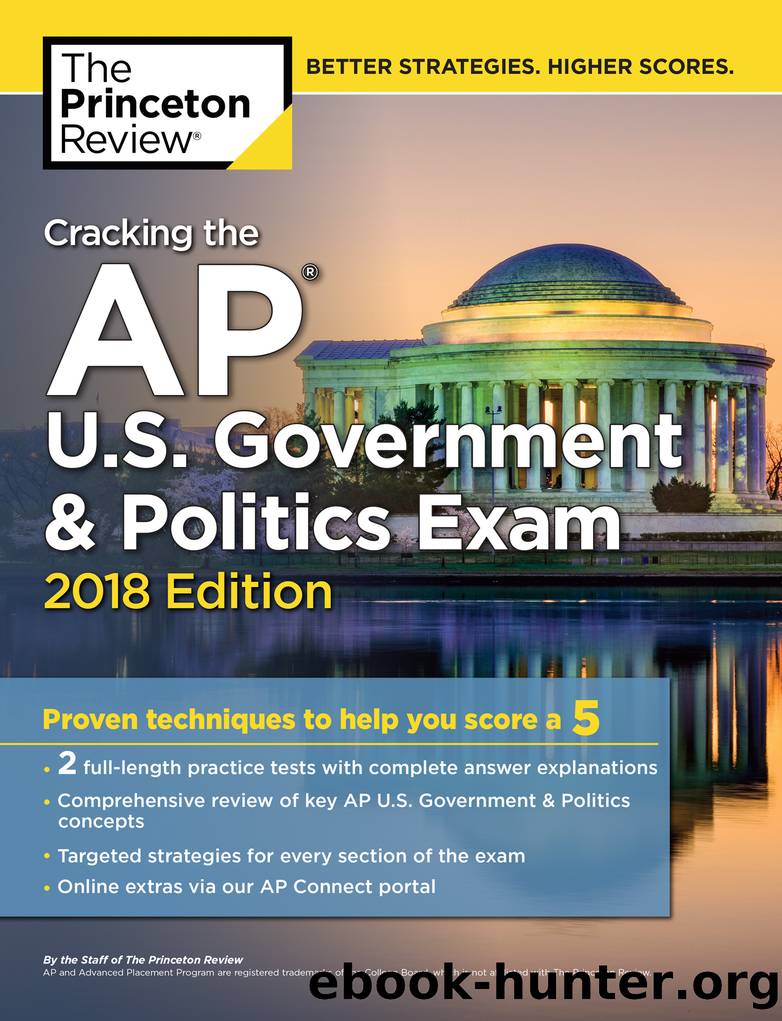Cracking the AP U.S. Government & Politics Exam, 2018 Edition by Princeton Review

Author:Princeton Review [The Princeton Review]
Language: eng
Format: epub
Publisher: Random House Children's Books
Published: 2017-10-24T00:00:00+00:00
THE JUDICIARY AND THE LAW
Concepts
⢠What circumstances are required for a case to be brought before the Supreme Court?
⢠How do politics enter into Supreme Court decisions?
⢠Why can it be said that all judicial decisions are activist?
⢠Why can it be said that a presidentâs strongest legacy is found in the judiciary?
⢠What control does Congress have over the judiciary?
American Legal Principles
Although the United States plays host to the interlocking systems of state and federal law, a few underlying principles make up the foundation of our legal system. They are equal justice under the law, due process of law, the adversarial system, and presumption of innocence.
All who appear in court in the United States must be treated as equals. The founders were very concerned that the new nation avoid the hierarchical legal systems that plagued many other nations and, as a result, enshrined many amendments in the Constitution that establish equal justice under the law. For example, whenever jurors hear a criminal case, they are instructed not to privilege the testimony of a police officer over that of a defendant.
Due process can be divided into two types: substantive due process and procedural due process. Substantive due process law deals with the question of whether laws are fair. Fairness is determined by looking at the Constitution, specifically the Bill of Rights and the Fourteenth Amendment. A law that made it illegal for people with blue eyes to ride motorcycles would constitute a violation of substantive due process. Procedural due process law is concerned with the question of whether laws are fairly applied. This might seem less important than substantive due process, but procedural issues are actually at the heart of our legal system. If suspects in certain types of crimes were held for ten years before they ever had a trial, this would be a violation of procedural due process, because the law guarantees everyone a speedy trial. Even if a nation has laws that are fair and just, if they are not applied fairly, they are meaningless.
Strange as it may seem to those of us raised in the United States, many nations do not require both sides of legal cases to be represented by advocates. This inquisitorial system, as it is known, is alien to the United States, where we use the adversarial system. As you can probably guess from the name, this principle is based on the premise that the best way to work out questions of fact is to have two sidesâor adversariesâdebate the burden of guilt or liability in a situation. Some critics say that this system creates too many conflictsâparticularly in areas such as family law and divorce, and recommend an increased role for mediators who seek rapprochement and can make legally binding decisions.
In his Commentaries on the Laws of England, English jurist and professor William Blackstone said, âBetter that ten guilty persons escape than that one innocent suffer,â and this number became known as the Blackstone ratio. Benjamin Franklin expanded this, writing âthat it is better [one hundred] guilty Persons should escape than that one innocent Person should suffer.
Download
This site does not store any files on its server. We only index and link to content provided by other sites. Please contact the content providers to delete copyright contents if any and email us, we'll remove relevant links or contents immediately.
Harry Potter: A Journey Through a History of Magic by British Library(385)
The Science of Philip Pullman's His Dark Materials by Mary Gribbin(364)
The Basics of Organic Chemistry by Clowes Martin;(355)
Harry Potter and the Sorcerer's Stone: SparkNotes Literature Guide by SparkNotes(325)
Braiding Sweetgrass for Young Adults by Robin Wall Kimmerer(298)
Flowers in the Gutter by K. R. Gaddy(292)
Summary of the Selfish Gene by Readtrepreneur Publishing(284)
Super Simple Chemistry by D.K. Publishing(282)
JavaScript Coding for Teens: A Beginner's Guide to Developing Websites and Games by Yueh Andrew(281)
Exam Success in Geography for IGCSE & O Level by Unknown(273)
Dark days in Salem: the witchcraft trials by Deborah Kent(261)
The Python Audio Cookbook;Recipes for Audio Scripting with Python by Alexandros Drymonitis(260)
Key Immigration Laws by Kathryn Ohnaka(251)
Analysis and Linear Algebra for Finance: Part II by Bookboon.com(250)
Cracking the AP Economics Macro & Micro Exams, 2017 Edition by Princeton Review(241)
Solutions for a Cleaner, Greener Planet: Environmental Chemistry by Marc Zimmer(237)
Reverse Engineering For Everyone! by mytechnotalent(229)
The Science of Fashion by Julie Danneberg;(229)
Cracking the AP Psychology Exam, 2017 Edition by Princeton Review(215)
